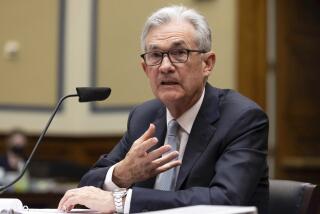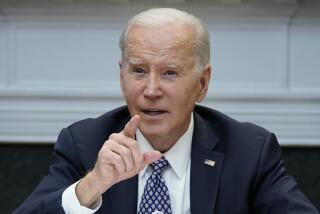Steady Economic Gains Through ’96 Seen : Finance: President’s advisers predict annual growth of 2.5% to 3% with relatively mild inflation and low unemployment.
- Share via
WASHINGTON — The nation’s economy will continue its recent pattern of steady growth through the 1996 election year, expanding at an annual rate of 2.5% to 3%, with relatively mild inflation and low unemployment, President Clinton’s top economic advisers predicted Monday.
The moderate-growth, low-inflation scenario envisioned by the President’s economic team would represent “an extremely successful” track record that could boost his chances of being elected to a second term, said Robert E. Rubin, Clinton’s assistant for economic policy.
Despite the rosy hue of the White House forecast, the latest economic indicators and current business conditions indicate that “the odds favor it,” Rubin said. The economy expanded at a rate of 3% during the first quarter of 1994 and many analysts say that is about as fast as it can grow over long periods of time without rekindling inflation.
Rubin acknowledged that the Administration will have to be “watchful” to ensure that the economy does not begin to overheat, thereby putting pressure on prices to rise and prompting the Federal Reserve Board to raise interest rates, potentially choking off the recovery.
Clinton, in an ABC-TV interview, said there is no compelling evidence that a significant increase in inflation is on the horizon. He said the Federal Reserve should not raise interest rates again as long as price increases do not begin to accelerate.
The Fed has boosted short-term interest rates four times since February in an effort to prevent the economy from growing too rapidly. Although the central bank has not ruled out additional increases, Fed Chairman Alan Greenspan has indicated that he thinks rates have risen enough for now.
Speaking to reporters in a luncheon interview, Rubin and his deputy, Gene Sperling, said they believe that the economy is “on track” to produce the 8 million new jobs that Clinton, in his 1992 presidential campaign, said his economic program would create by 1996.
Sperling said that 3.4 million new jobs, including about 3.1 million in the private sector, were created during Clinton’s first 16 months in office. Moreover, the job growth continued during the last quarter despite a significant decline in government spending, a feat that is “almost unprecedented in this century,” he said.
Reaching the goal of 8 million new jobs might earn political points for the President, but some economists would not be overly impressed. Allen Sinai, an economist with the Lehman Brothers investment firm, said Clinton’s economic team has been “low-balling” its job creation goals. In a typical cyclical recovery, he said, total job creation could be expected to reach 10 million.
Clinton’s target is “well-intentioned but I think it’s not very much,” said Sinai, who has advised both the Clinton and George Bush administrations on economic policy. “If it’s only 8 million, I could only give them a gentleman’s ‘C.’ ”
Some Administration officials have lamented the fact that many of the jobs created since the recovery began are temporary or in the service sector, where wages tend to be lower.
Rubin, who made a fortune estimated at more than $100 million as a Wall Street financier, said business executives clearly respect what the President has done to reduce the federal deficit. But he said they are not “coalescing” the way he thinks they should around a White House economic program that is favorable to business.
Many business executives still have reservations about Clinton, Rubin said, noting that some of them are Republicans and apparently have difficulty perceiving any Democrat as pro-business.
Instead of looking at the 70% of the Clinton economic program that reflects their interests, Rubin said, business executives tend to “look at the 30% they don’t like, and disregard the art of what is politically doable.”
Rubin expressed frustration that despite the growth, Clinton gets relatively little credit from the American people, who, according to polls, have serious reservations about the President’s character.
The character issue, revolving around allegations of womanizing and financial improprieties while Clinton was Arkansas governor, should focus on his activities since he became President, Rubin said.
More to Read
Inside the business of entertainment
The Wide Shot brings you news, analysis and insights on everything from streaming wars to production — and what it all means for the future.
You may occasionally receive promotional content from the Los Angeles Times.










